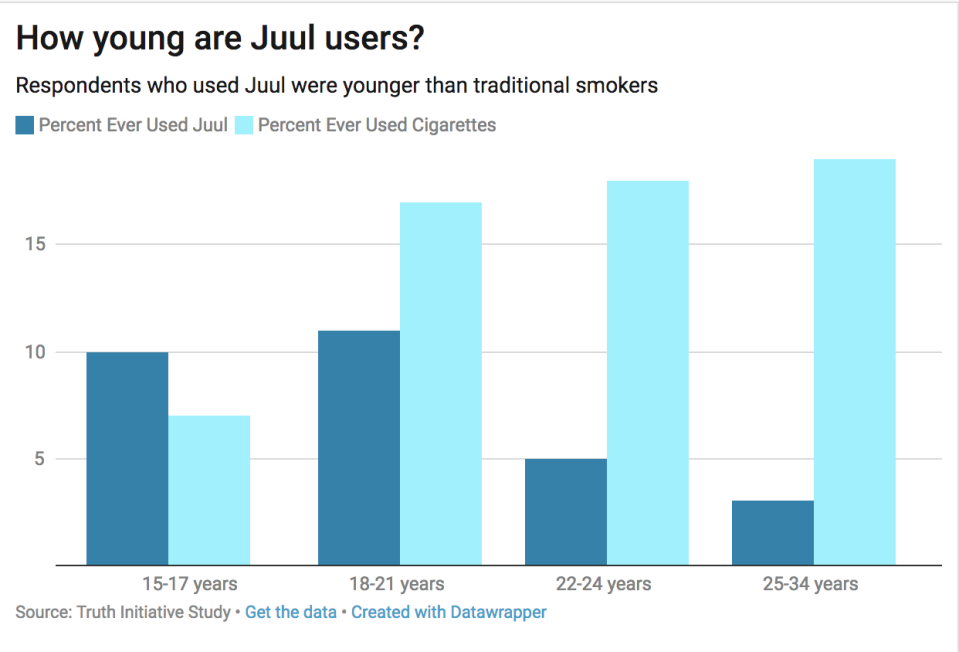Teens 16 times more likely to use Juul than older groups: study
A new study looking at e-cigarette use among high schoolers has shed new light on a problem that has increasingly reached “epidemic” proportions.
A Truth Initiative study, published Tuesday in Tobacco Control, revealed strong evidence that seemingly counters the message championed by e-cigarette manufacturers, including industry leader Juul Labs, which claims its market-leading Juul e-cigarette is intended to help adult smokers quit more so than its meant to attract younger users.

The crucial finding in the study of more than 13,000 people was that 15- to 17-year-olds were in fact 16 times more likely to be current Juul users compared to 25- to 34-year-olds.

“When you consider that more than 50% of the 15- to 17-year-olds surveyed use Juul three or more times a month and 25.3% used it 10 or more times, this is not experimentation — it’s a pathway to addiction,” said Robin Koval, CEO and president of Truth Initiative, a nonprofit advocacy research group, in a statement. Respondents aged 15- to 17-years-old, which accounted for about 17% of the study’s sample, also indicated they were more likely to be e-cigarette users than traditional cigarette users.
The findings from the study largely echo concerns more recently raised by U.S. Food and Drug Administration Commissioner Dr. Scott Gottlieb, who last month admitted he underestimated the problem that e-cigarettes would pose and didn’t foresee it growing to the “epidemic proportion” it has today. In an op-ed, Gottlieb pointed to National Youth Tobacco Survey data that showed e-cigarette use among high schoolers had spiked 77% in the last year as the reason behind his increased attention to the issue.
FDA aims at cracking down on Juul
Most of that increased attention has been focused on Juul Labs, the $15 billion company behind the most popular e-cigarette, which accounts for about 75% of the entire e-cigarette market with about $1.4 billion in annual sales, according to data from Wells Fargo analyst Bonnie Herzog. In September, the FDA announced it completed an unannounced on-site inspection at Juul’s San Francisco headquarters and gave the company, and other top manufacturers, 60 days to deliver plans to help curb underage use. So far, the FDA says no plans have been submitted.
For its part, Juul has steadfastly clung to its message that it’s e-cigarette is meant to help smokers wean themselves off traditional cigarettes by delivering nicotine in a different way. Juul could not immediately comment on Truth Initiative’s latest study because it had not seen the results.
“We are focused on engaging with FDA, lawmakers, regulators, public health officials and advocates to drive awareness of our mission to improve the lives of the world’s one billion smokers and to combat underage use so we keep Juul out of the hands of young people,” said a Juul Labs spokesperson in an earlier statement. The company also previously told Yahoo Finance the average age of its online customer was 31-years-old, though those sales only accounted for about 10% of Juul’s revenue.
Is a ban on e-cigs enough?
Last month, Gottlieb said he was considering a ban on online e-cigarette sales. Many anti-tobacco advocacy groups said that move isn’t going far enough. Those same groups, including Campaign for Tobacco-Free Kids, sued the government agency in March after it decided to delay instituting certain e-cigarette restrictions until it had more data on how the products were being used.
“It is illegal, unreasonable and devastating for the public health for the FDA to postpone its oversight obligations any further,” the American Medical Association wrote in an October amicus brief supporting the lawsuit after the FDA motioned for it to be dismissed.
Since the lawsuit, the FDA has been noticeably more active in monitoring and addressing the situation.
“I’ll be clear,” Gottlieb wrote in a September press release. “The FDA won’t tolerate a whole generation of young people becoming addicted to nicotine as a tradeoff for enabling adults to have unfettered access to these same products.”
Juul now also faces investigations from attorneys general in Massachusetts and North Carolina.
Zack Guzman is a reporter for Yahoo Finance. Follow him on Twitter @zGuz.
Read more:
How Juul became the FDA’s latest target
Juul surpasses Facebook as fastest startup to reach decacorn status

 Yahoo Finance
Yahoo Finance 